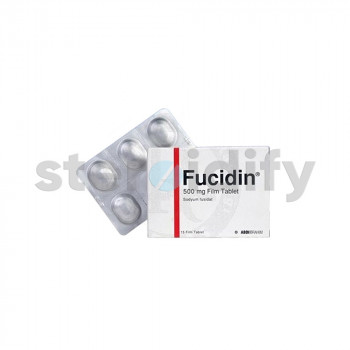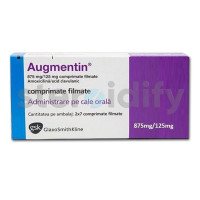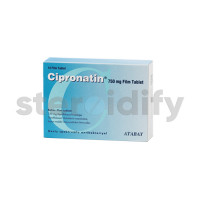What is Fucidin?
Fucidin is indicated in the treatment of all staphylococcal infections due to susceptible organisms such as: cutaneous infections, osteomyelitis, pneumonia, septicaemia, wound infections, endocarditis, superinfected cystic fibrosis.
Fucidin should be administered intravenously whenever oral therapy is inappropriate, which includes cases where absorption from the gastro-intestinal tract is unpredictable.
Posology and method of administration
Posology
For staphylococcal cutaneous infections:
Adults:
Standard dose: 250 mg sodium fusidate twice daily for 5-10 days.
For staphylococcal infections such as osteomyelitis, pneumonia, septicaemia, wound infections, endocarditis, superinfected cystic fibrosis.
Adults:
Standard dose: 500 mg sodium fusidate 3 times daily.
In severe cases of fulminating infections, the dosage may be doubled or appropriate combined therapy may be used.
Elderly: No dosage alterations are necessary in the elderly.
Since Fucidin is excreted in the bile, no dosage modifications are needed in renal impairment.
The dosage in patients undergoing haemodialysis needs no adjustment as Fucidin is not significantly dialysed.
Method of administration
For oral administration.
Special warnings and precautions for use
Statins (HMG-CoA reductase inhibitors) and systemic Fucidin must not be co-administered. There have been reports of rhabdomyolysis (including fatalities) in patients receiving this combination (see section 4.5). In patients where the use of systemic Fucidin is considered essential, statin treatment should be discontinued throughout the duration of treatment with systemic Fucidin. The patient should be advised to seek medical advice immediately if they experience any symptoms of muscle weakness, pain or tenderness. Statin therapy may be re-introduced seven days after the last dose of systemic Fucidin. In exceptional circumstances, where prolonged systemic Fucidin is needed e.g. for the treatment of severe infections, the need for co-administration of HMG-CoA reductase inhibitors and systemic Fucidin should only be considered on a case by case basis and under close medical supervision.
In a few cases, serious cutaneous reactions putting life at risk such as Drug Reaction with Eosinophilia and Systemic Symptoms (DRESS) syndrome, toxic epidermal necrolysis (Lyell's syndrome) and Stevens-Johnson syndrome have been reported with systemic Fucidin. Patients should be advised to monitor cutaneous reactions as well as signs and symptoms suggestive of these reactions which usually appear in the first weeks of therapy. If such reactions are suspected to be due to systemic Fucidin, treatment with systemic Fucidin should be stopped and it is recommended not to reintroduce the therapy.
Fusidic acid is metabolised in the liver and excreted in the bile. Elevated liver enzymes and jaundice have occurred during systemic Fucidin therapy but are usually reversible on discontinuation of the drug.
Systemic Fucidin should be given with caution and liver function should be monitored if used in patients with hepatic dysfunction or in patients taking potentially hepatotoxic drugs. Caution is required in patients with biliary disease and biliary tract obstruction. Caution is required in patients treated with HIV-protease inhibitors (See section 4.5). Fusidic acid competitively inhibits binding of bilirubin to albumin. Caution is necessary if systemic Fucidin is administered to patients with impaired transport and metabolism of bilirubin. Particular care is advised in neonates due to the theoretical risk of kernicterus.
Bacterial resistance has been reported to occur with the use of fusidic acid. As with all antibiotics, extended or recurrent use may increase the risk of developing antibiotic resistance.
Patients with rare hereditary problems of galactose intolerance, the Lapp lactase deficiency or glucose-galactose malabsorption should not take this medicine due to the content of lactose.
Essential Information About Fucidin.
Fucidin is an antibacterial cream that’s used for skin ailments. Both adults and children can use the cream. Some of the most common names include Fucidin H, Fucidin, Fucibet, and Xemacort. Amongst the infections that Fucidin treats is impetigo, infected dermatitis, and infected cuts/grazes.
How does it work?
Well, it stops the growth of any germs that might be causing an infection. It’s the best means of clearing a skin infection quickly – especially when the infection covers a small area. If you have a larger infection, it's advisable getting some antibiotics. It can either be in the form of tablets for adults or liquid medicine for children. For inflammation, your doctor should prescribe some Fucidin and an anti-inflammatory agent.
What to Know before using Fucidin
Always ensure you disclose any pregnancy to your doctor. Fucidin might not affect your baby, but it would be essential for your doctor to know about the pregnancy. Furthermore, if you have any allergic reaction to the medicine, let your doctor know. He or she will be able to countercheck the ingredients available in Fucidin to know whether you'll have any negative effects/reactions.
Application of Fucidin Ointment/Cream
Your doctor might be precise when explaining the application process. However, you should read the manufacturer’s information from the leaflet. Here, you're able to know how to use the brand of Fucidin, and you'll know about the different side effects of the ointment.
After reading the leaflet, you should proceed to apply the ointment as prescribed by your doctor. Always apply a thin layer and proceed to rub it gently on the infected area. This should occur for 3 to 4 times a day – unless your doctor says otherwise. After using, remember to wash your hands, as long as they're not the ones you're treating.
The treatment might last for almost seven days. Never use the cream when your doctor hasn’t instructed you to do so. Likewise, never use the ointment for longer than ten days.
Getting the Most from Fucidin
After a few days of treatment, you should detect some changes on your skin. In case you don’t see any changes, notify your doctor. He or she will be able to explain and examine why there's no improvement. At times, no changes might be because the antibiotics aren’t working – meaning that you'll need an alternative. You should make an appointment with your doctor in case the infection doesn’t go after the treatment.
Avoid touching the infected area unless you're applying the ointment. Since most skin infections are contagious, you should be careful to avoid any new infections. When living with another person, use different facecloths and towels. Moreover, you should be careful when applying the treatment on your face – your eyes are precious. In case it gets into your eyes, rinse with warm water.
Side Effects of Fucidin
Irritation is a common side effect of Fucidin. It's mild, and it won't cause any trouble. However, when the irritation persists, always seek some aid from your doctor. Allergic reactions too might occur, but they're rare. Rashes aren’t common; therefore, you should notify your pharmacist or doctor immediately. Speak with your doctor when you detect other symptoms that might be deteriorating the healing process.
Storing Fucidin
If you have kids around your house, always store the ointment or cream out of reach. You can use a great location that no one can reach. Even though the place you decide to store is private, always ensure that no one will access it. Sharing the medication too isn’t ideal. Different people will have different infections.
Meaning that you should advise someone else to visit a doctor. Doing so will ensure that the doctor conducts some assessment to know what might be the cause of their infection. When they have the same infection, they should get their treatment. Sharing the treatment might decrease your chances of getting rid of the infection.
Moreover, store the ointment in a dry place. Avoid direct heat or light since it might neutralise the effectiveness of the ointment. Cool areas will ensure that the cream or ointment is always in room temperature. Indicating that it can stay for longer periods without expiring. More so, always complete the treatment even after healing. It ensures that the infection is completely treated.
Final Take
Fucidin should only be applied to the skin, never swallow, and in case someone swallows it, don’t hesitate to call the emergency department. Moreover, when having an operation, always ensure that your doctors know the medicines that you're using, including any ointments. It'll ensure that they can plan accordingly.
In case you purchase Fucidin with other medicine, ask the pharmacist whether you should store and use alongside other medication. If the medicine is out of date, don’t keep it in your house. Always dispose of them safely by taking them to the local pharmacy. Here, you'll have some peace of mind since you won't need to keep any unwanted medicine around.
Finally, it's always crucial to seek assistance from your doctor. Never self-diagnose any problems which you might be facing. Communicating with the doctor will ensure that you get a precise and timely diagnosis and treatment.
Sutton, Barbara A. M.D
ID/HIV Specialists




